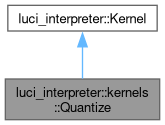#include <Quantize.h>

Public Member Functions | |
| Quantize (const Tensor *input, Tensor *output) | |
| const Tensor * | input () const |
| Tensor * | output () const |
| void | configure () override |
| void | execute () const override |
 Public Member Functions inherited from luci_interpreter::Kernel Public Member Functions inherited from luci_interpreter::Kernel | |
| virtual | ~Kernel ()=default |
| const std::vector< const Tensor * > & | getInputTensors () const |
| const std::vector< Tensor * > & | getOutputTensors () const |
Additional Inherited Members | |
 Protected Member Functions inherited from luci_interpreter::Kernel Protected Member Functions inherited from luci_interpreter::Kernel | |
| Kernel (std::vector< const Tensor * > inputs, std::vector< Tensor * > outputs) | |
 Protected Attributes inherited from luci_interpreter::Kernel Protected Attributes inherited from luci_interpreter::Kernel | |
| const std::vector< const Tensor * > | _inputs |
| const std::vector< Tensor * > | _outputs |
Detailed Description
Definition at line 28 of file Quantize.h.
Constructor & Destructor Documentation
◆ Quantize()
Definition at line 64 of file Quantize.cpp.
References input().
Member Function Documentation
◆ configure()
|
overridevirtual |
Implements luci_interpreter::Kernel.
Definition at line 66 of file Quantize.cpp.
References input(), LUCI_INTERPRETER_CHECK, output(), and luci_interpreter::Tensor::resize().
◆ execute()
|
overridevirtual |
Implements luci_interpreter::Kernel.
Definition at line 101 of file Quantize.cpp.
References luci_interpreter::kernels::getTensorShape(), input(), luci::must_cast(), output(), luci_interpreter::Tensor::scale(), and luci_interpreter::Tensor::zero_point().
◆ input()
Definition at line 33 of file Quantize.h.
References luci_interpreter::Kernel::_inputs.
Referenced by configure(), execute(), and Quantize().
◆ output()
|
inline |
Definition at line 34 of file Quantize.h.
References luci_interpreter::Kernel::_outputs.
Referenced by configure(), and execute().
The documentation for this class was generated from the following files:
- compiler/luci-interpreter/src/kernels/Quantize.h
- compiler/luci-interpreter/src/kernels/Quantize.cpp